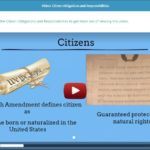Civics and Citizenship explores both the rights guaranteed to Americans as well as the attendant responsibilities that come with those rights. Ultimately, the unit culminates with students writing, producing, and sharing a Public Service Announcement that defines, shows, and advocates for civic engagement. The goal of the lesson is that students actively assume the responsibilities of an engaged and thoughtful citizen.
Rights in America
This DocsTeach page includes a variety of primary sources and teaching activities exploring the ways Americans, including African Americans and others, have fought for, attained, and protected their rights. Many documents at the National Archives illustrate how individuals and groups asserted their rights as Americans. Use this site to find teaching activities to explore the topics such as slavery, racism, citizenship, women’s independence, immigration, and more.
Citizenship and the U.S. Constitution
In this lesson students will examine the concept of “citizen” from a definitional perspective of what a citizen is and from the perspective of how citizenship is conferred in the United States. Students will discuss the rights and responsibilities of citizens and non-citizens and review the changing history of citizenship from colonial times to the present.
In Pursuit of Equity: Women, Men, and the Quest for Economic Citizenship in 20th-Century America
Alice Kessler-Harris of Columbia University discusses citizenship for men and women in the context of the Industrial Revolution and increasing economic tensions.
Can You Pass the Citizenship Quiz?
Could you pass the US citizenship test? Take these quizzes to see how well you know the American history and civics required of people taking the naturalization test. The actual test is not multiple choice, but these are the 100 questions from which each potential citizen’s 10-question civics and history exam are drawn.
Citizen Obligations and Responsibilities

This resource provides students with an English language video and associated student friendly readings (in English, Spanish, and Haitian Creole), as well as reading and video guides and self assessment tools. Using these, students will explore the obligations and responsibilities of citizenship.
Free registration is required to use the resource.
Civics Flash Cards for the Naturalization Test

This flash card set of 100 questions and answers was developed to help immigrants prepare for the naturalization test. By providing questions and answers about U.S. history and government, they also are a great tool to use in the classroom for citizenship preparation. Note that some answers may vary from state to state while others may change because of elections or appointments. The flash cards were created by the U.S. Citizenship and Immigration Services, and last revised in February 2012.
Natural Rights, Citizenship Rights, State Rights, and Black Rights: Another Look at Lincoln and Race
In the real world, the ability of free blacks to enjoy their natural rights and exercise the privileges and immunities of citizenship depended on the states where they actually lived. When those states imposed a raft of legal discriminations on free blacks they cheapened the meaning of freedom and discounted the value of citizenship. I suspect this bothered Lincoln, but it wasn’t his issue. It would take other men and women, and another century of struggle, before “states rights” was abolished. Free registration for students and teachers required to access resource.
Reconstruction and Citizenship
Historian Eric Foner, of Columbia University, discusses the major changes in citizenship during and after the Civil War, particularly for African Americans.
Defining Classroom Citizenship
The founders understood that, in order to preserve their liberty and happiness, and that of future generations, the foundation of successful self-government was citizens who understood and applied certain virtues. They constructed the U.S. Constitution according to their study of the principles and virtues that were most necessary to sustain a free, prosperous, and orderly society. This lesson is ideal for the first day of school.